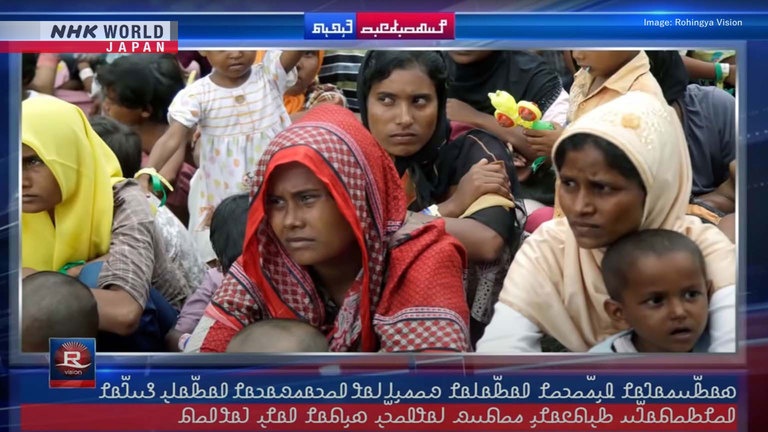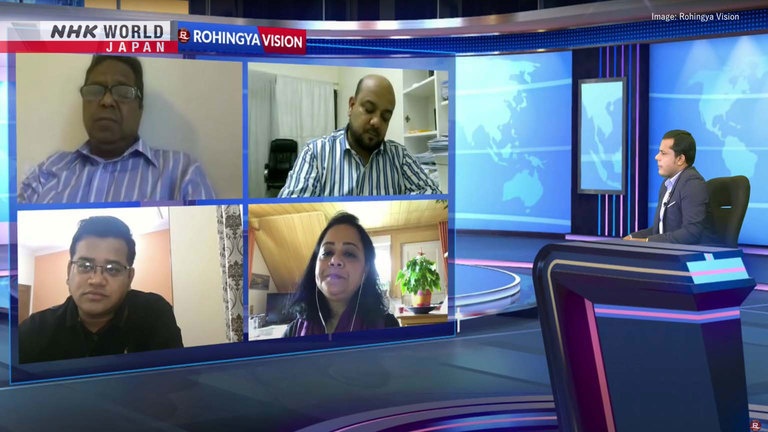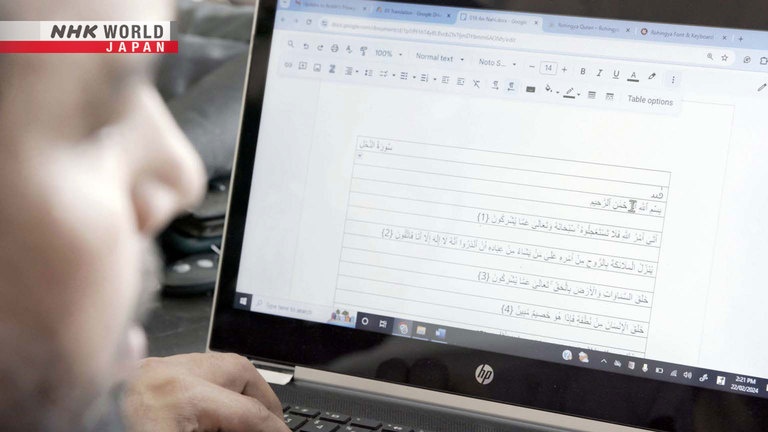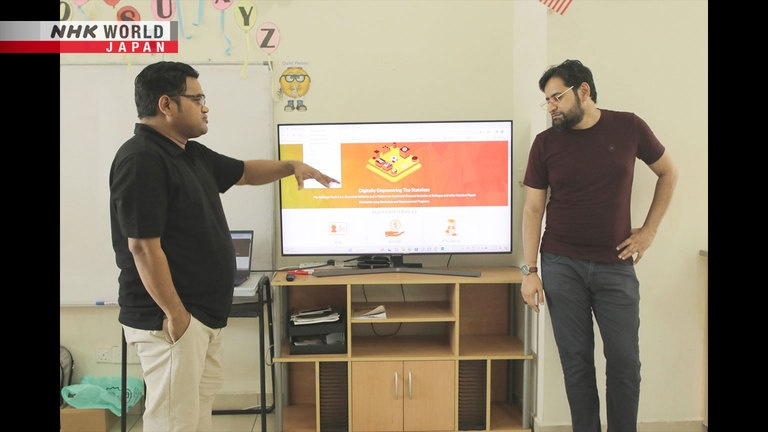Bridging Rohingya Through Digital: Muhammad Noor / Founder of the Rohingya Project
Muhammad Noor works to unite stateless Rohingya refugees through digital language preservation and creating digital IDs, offering vital support to their community.




Transcript
Direct Talk
Many Muslim Rohingya minorities
residing in western Myanmar
are compelled to flee their homeland,
becoming refugees,
with the majority lacking citizenship.
Muhammad Noor, a Rohingya,
established the grassroots initiative called
the "Rohingya Project."
He leveraged his expertise
in computer science
and has pioneered the issuance of
digital IDs for his stateless community.
Identity is the core,
important factor that sticks and glues.
Numerous Rohingya fled the nation
during the military crackdown
by the Myanmar military in 2017.
Almost a million individuals remain unable
to return to their homeland.
Without proper documentation,
they cannot freely travel, access education,
or receive medical care, leading them
to endure harsh conditions worldwide.
Now the question is what happens
if your own government disown you?
If your own government say
you are not my people, then what happened?
I would like to identify myself as a person,
as a normal human being.
This is a basic human right.
Noor employs his digital expertise
to preserve the Rohingya language
and foster a renewed sense of identity,
aiming to bolster ethnic connections.
His goal is to forge ties and build bridges.
Bridging Rohingya Through Digital
Noor and the Rohingya Project are
presently based in Kuala Lumpur,
where they collaborate with colleagues
who have escaped persecution
under the Myanmar government.
Together, they strive to address
the challenges confronting their community.
I am the co-founder of
Rohingya Vision, Rohingya Project,
Rohingya Language Council
and many other organization
along with and education on Academy.
And one of the main reason
that drives me to do this is because
Rohingya is one of the most marginalized
and persecuted community in the world,
and now it is being bussed
all around the world.
So this is where I introduce all this project
to help and elevate from poverty
and empower them.
Arson and torture have been continuing by
the Myanmar military.
They operate a Rohingya language
news channel, broadcasting vital information
to Rohingya individuals
dispersed across the globe.
In Myanmar, restrictions
barred them from learning
or sharing information
in their native language.
But, in cyberspace, they can freely
communicate within their ethnic community,
utilizing their own language
without encountering any limitations.
This is a survival technique and
this is a survival matter for the community.
This language not only disappear,
but this language also develops and thrive.
And everybody should know.
Persecution of the Muslim Rohingya
intensified in the 1960s
in predominantly Buddhist Myanmar.
In 1982, a law was passed that
didn't allow the Rohingya, their citizenship.
Rohingyas born in Myanmar
are denied citizenship
and face restrictions
in many aspects of life,
leading to a growing exodus from the country.
Noor's parents were no exception.
He was born to a couple
who had fled to Mecca, Saudi Arabia,
and like them,
he did not possess citizenship.
We have no documents,
so we have no access to education,
we have no access to health facilities.
I need to find a way,
how can I get to education.
Because education is
one of the key for a successful life.
Noor couldn't attend school
due to his illegal status.
However, private tutors from the community
assisted him with his studies.
Growing up, he faced
numerous challenges and restrictions.
At 18, Noor's turning point came
when he obtained a Pakistani passport
through negotiations
with authorities in the country,
where his family had immigrated.
That's where my life is started to change.
That's where the perspective has changed that
if there is a will, there will be a way
and I will find a way.
We are appreciative of what I am today
because those hardship made me realize
that I want to get out of this life.
I want to change my life.
I will not live my life like that.
I have to make some changes
not only for myself, also for my community.
After intensive study,
Noor was offered the chance
to enroll in a Malaysian university,
where he pursued computer science, laying
the groundwork for his current activities.
After graduating from university,
Noor founded a software company in Malaysia,
developing programs for banks
and state-run enterprises,
employing over 25 people at its peak.
But, as we move along that I realized
that this is a pure moneymaking machine.
Moneymaking machine only works
if your desire is to live a luxury life.
But that is not my thing.
So I realized that this is empty.
So one of my passion is from the beginning
is how can we help the community
using not only technology
but using available resources
rather than contacting people
or asking for help.
That's why I decided
to start a new initiative
that can impact the community,
that can impact the people.
Upon leaving the company, Noor's initial
focus was preserving his ethnic identity,
which involved digitizing
the Rohingya language.
Because language is one of the most important
glue to stick the community together.
That is the common thing that
we all have and the culture as well.
Now the Wall is now getting computerized,
the word is getting into digital.
But unfortunately,
if these things cannot get into digital,
cannot go into this one,
then this language will die.
That's where my concern came and
I said, I will make sure that
this language does not die.
These are letters in the Rohingya language.
Noor and his colleagues
dedicated nearly a decade
to developing and advocating
for the Rohingya script,
which was previously
not compatible with computers.
In 2011, they submitted an application
to register the Rohingya script in Unicode,
which is an
internationally-recognized standard.
After an additional six years of refinement,
the Rohingya language
was officially registered.
It is now accessible on
all computers and smartphones.
Sometime people cry saying that
we have never expected
that the Rohingya language
will be in such a global stage.
It's unimaginable happiness
and the fabric along the community.
They are the happiness that,
you know, treeless
across the Rohingya community
all around the world.
The Burmese government and the military
want to destroy from the Earth
the culture, the history, the language.
Today, we can say they cannot do that anymore
because we not only exist in the world,
we also exist in their pockets,
in their phones, in their laptops.
Noor will make the Rohingya version
of the Quran accessible
on smartphones and other digital devices,
as it was previously unavailable
in their language.
That is an extreme project
that we are working on
that not only connecting people to God
and heart, but also making the language alive,
making a language that has a connection
that people can communicate,
and people can relate to.
So I tell my friends and my fans
you don't have to appreciate me.
If you want to appreciate, use the language,
use the technology so that it become
more available and teach to your kids.
Teach your next generation
so that this legacy can continue.
Another of Noor's passions
is operating Rohingya Vision
a unique media platform
established by Rohingyas, for Rohingyas.
Rohingyas were recruited
and trained as journalists
documenting instances of violence and abuses
by Myanmar's military regime
in both Rohingya and English languages.
But most importantly, how can we make
this community more aware so that a lot of
Rohingya do not even know their own plight
because they have been
disconnected from Arakan.
They are getting it through
international media, through English version.
Now they are directly listening,
their own crying of their own people
on village, on babies and all this,
which is unfortunately so horrible.
Rohingya Vision has received
extensive feedback from its viewers.
Along with that, not only doing that
in terms of archival but also
genocide archive not only
preserving this evidence for tribunal,
but also preserving as a community memory
so that this community should never forget
that how Burmese government
and military has bulldozed and now today,
10 years ago there used to be a village.
Noor has carefully preserved
content beyond repression.
He is protecting ethnic history
and safeguarded the images of
celebrations in Rohingya's former hometowns.
So this was our homeland.
This was our persecution.
So we express that rather than
through talk shows or through news,
we express that through the songs,
we express that through the heart so that
it can be heard and listened and felt.
So that's a lot of emotion involved.
And we also did, we have proverbs.
How can, so that this language
has been destroyed
so people are not talking about culture,
which is like food, proverbs and language.
So we also trying to make as many as programs
so that these things can survive
at least digitally.
The Rohingya's digital initiatives
are now entering a new phase.
Presently, Noor's activities center on
issuing digital identification for his people,
with support from
research institutions worldwide.
We have started seeing that
how can we build our own identity system,
not a centralized one, because we are
the victim of centralized institute
so we can build a decentralized institute.
This is where a technology
recently emerged called the blockchain.
Blockchain operates
without a specific administrator.
Instead, it is stored and managed by
participants utilizing cryptography.
It's not controlled by any government authority
and resistant to data tampering and hacks.
Members worldwide can join.
Noor believes that the system
can be self-managed by the Rohingya,
without external intervention
when producing IDs.
At least we have a basic human right
which is an access to internet,
which an access to some sort of
digital ID that this is where am I.
This is who is my father, this is
who is my child, and so on and so forth.
And so this could be the key for uplifting
the community from below the poverty line
to at least on the poverty line
or above the poverty line.
Noor painted a visionary
picture of the future.
I want to make people as dignified people
across the world,
not only Rohingya,
but everyone who is marginalized.
We thought we couldn't do anything.
We are refugees.
We thought we are stateless.
We have no place to go.
But we used to put our head down.
Now we can put our head up and then
tell to the world that this is who we are,
this is what we do, this is our community.
So the idea of the Rohingya project
is to build a model,
to build a model using technology
and also using experiences
and solving a real problem,
a real-world problem
that faced by millions of people.
There's many other people
around the world being displaced.
Look at Yemen, look at Iraq, look at Syria.
So now lives are destroyed.
So my dream is how can we
give a platform for
the marginalized community
to be a dignified person
or to be a dignified people
so that they can thrive like
any other nation across to the globe.